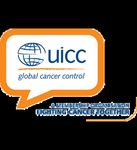April 2022 Donate now - IARC
←
→
Page content transcription
If your browser does not render page correctly, please read the page content below
View this email in your browser
Donate
now
April 2022
Dear friends of the Agency,
To mark Rare Disease Day on 28 February, IARC highlighted the burden of rare
cancers, which are cancer types with fewer than 6 newly diagnosed cases per
100 000 people per year. The Rare Cancers Genomics Team, formed by IARC
scientists, aims to develop innovative research projects to improve the prognosis
of patients diagnosed with these rare diseases.
During the Fifty-Eighth Session of the IARC Scientific Council in February, the
objective of the new IARC COVID-19 and Cancer (IARC-C19) Initiative was
presented: a "build back better" proposal that aims to provide a global platform
to monitor national policies in the wake of the pandemic and their impact on
cancer services and outcomes, and provide the evidence needed to support
decision-making in cancer control. The IARC-C19 Initiative is in line with IARC’s
mission: supporting a coordinated approach among networks of cancer experts
and institutions worldwide, in close cooperation with the World Health
Organization (WHO).
On 3–4 February 2022, IARC participated in the European Cancer Meeting of the
French National Cancer Institute, Les Rencontres européennes de l’Institut
national du cancer (INCa), held in the context of the French Presidency of the
Council of the European Union. This meeting sought to increase cooperation and
enhance synergies to help Europe advance in the fight against cancer, for the
benefit of the citizens of the 27 Member States.
To mark Cervical Cancer Awareness Month in January 2022, IARC highlighted
research projects supporting the WHO Global Strategy to Accelerate the
Elimination of Cervical Cancer. As one key element of this research, IARC has
demonstrated, for the first time, the efficacy of a single dose of human
papillomavirus (HPV) vaccine in adolescent girls in India against persistent
infection with HPV types 16 and 18. Based on these IARC findings, the United
Kingdom Joint Committee on Vaccination and Immunisation (JCVI) has issued
interim advice to reduce the number of doses of HPV vaccine from two to one
for girls younger than 15 years, and this should be prioritized on resumption of
the vaccination programme interrupted by the COVID-19 pandemic.
Best regards,
Dr Elisabete Weiderpass
IARC DirectorIARC News IARC News IARC scientists are working in Professional tennis player cross-functional Research Caroline Garcia becomes a Teams Friend of IARC Read more Read more IARC launches the World Code IARC marks International Against Cancer Framework Women’s Day 2022 Read more Read more March is Colorectal Cancer Achieving equity in lung cancer Awareness Month screening for Black individuals Read more Read more
Focus on childhood cancer
Researching the origins of childhood cancer
Mapping the epigenomes in children with cancer from birth
to diagnosis can reverse the arrow of time to explore the
early origins of cancer. A project of the Epigenomics and
Mechanisms Branch, in collaboration with international
partners, aims to produce molecular maps of the DNA of
newborn babies, before the development of disease, to
enable scientists to create a molecular snapshot of early-
life factors that the baby had been exposed to during
pregnancy. To mark International Childhood Cancer
Day, IARC presented a video (available in 11 languages)
explaining how IARC researchers “time-travel” to
investigate the origins of childhood cancers.
Watch the video
Targeting Childhood Cancer through the Global
Initiative for Cancer Registry Development
(ChildGICR)
Researchers from St. Jude Children’s Research
Hospital and the Cancer Surveillance Branch collaborate
in a programme called ChildGICR that complements and
supports the World Health Organization (WHO) Global
Initiative for Childhood Cancer. Improving the quality and
availability of data on cancer in children, particularly in
countries with limited resources, is the aim of ChildGICR.
Both partners are engaged in the programme to develop
tools, build networks, and produce evidence to facilitate
the establishment of new registries and to support the
activities of existing structures.
Read more
The role of nutrition in childhood cancer prognosis
and late effects
The global burden of cancer in children is expected to rise,
particularly in low- and middle-income countries where
endemic rates of undernutrition are paralleled by a rapid
increase in the prevalence of obesity. Dr Inge Huybrechts, a
scientist in the Nutrition and Metabolism Branch,
describes the first standardized multinational study of how
nutrition and other lifestyle factors affect health outcomes
in children and adolescents with acute lymphoblastic
leukaemia, the most common cancer type in children.
Watch the videoFirst-ever WHO Classification of Tumours volume on
childhood cancers
Although paediatric tumours are uncommon, they are a
leading cause of death due to disease in children. The
types, molecular characteristics, and pathogenesis of
tumours occurring in children are unique, and paediatric
neoplasms lack the genetic complexity seen in adult
disease. In a recently released video, Dr Ian A. Cree, Head
of the Evidence Synthesis and Classification Branch,
speaks about the first volume of the WHO Classification of
Tumours series to specifically focus on the classification of
paediatric tumours. The main features of each chapter of
this inaugural volume are summarized in a new review
article published in the journal Cancer Discovery.
Watch the video
The World Health Organization Thanks to financial support IARC is investigating the
(WHO) Global Initiative for from Children with Cancer causes of childhood cancer
Childhood Cancer aims to UK, Dr Grace Akinyi Odongo and related risk factors, such
improve outcomes for children from Kenya and Dr Natália as environmental exposures,
with cancer around the world. Spitz Toledo Dias from Brazil lifestyle factors, and diet. In a
The goal is to give all children have been awarded IARC recently published article,
with cancer the best chance to Postdoctoral Fellowships IARC scientists in the
survive, to live full and focusing on childhood cancer. Environment and Lifestyle
abundant lives, and to live and Watch their testimonials and Epidemiology Branch and
die without suffering. listen to their insights into partners provide an umbrella
their stay and work at IARC in review of environmental risk
Read more the Epigenomics and factors for childhood acute
Mechanisms Branch. lymphoblastic leukemia.
Read more
Watch Grace's testimonial
Watch Natália's testimonial
UICC Technical Fellowships support short-term international visits
allowing cancer professionals to gain new skills and knowledge in
cancer control. The call is open until the end of the year, with
applicants from Francophone Africa able to apply in French. For
the first time, the programme is accepting applications for visits of
two to eight weeks, allowing applicants more flexibility and
ensuring that the length of the visit can be tailored to best support
the Fellowships objectives.#cancerresearchthatmatters
iarc who iarc who @iarcwho www.iarc.who.int
Was this email forwarded to you?
Sign up now
Subscribe to our newsletter to stay informed
Copyright © 2022 International Agency for Research on Cancer, All rights reserved.
You are receiving this email because you have engaged with IARC in the past or because you opted in on
our website.
Our mailing address is:
International Agency for Research on Cancer (IARC)
150 Cours Albert Thomas
Lyon 69008
France
Want to change how you receive these emails?
You can update your preferences or unsubscribe from this list.
Kindly note that the WHO/IARC privacy policy applies.You can also read



























































